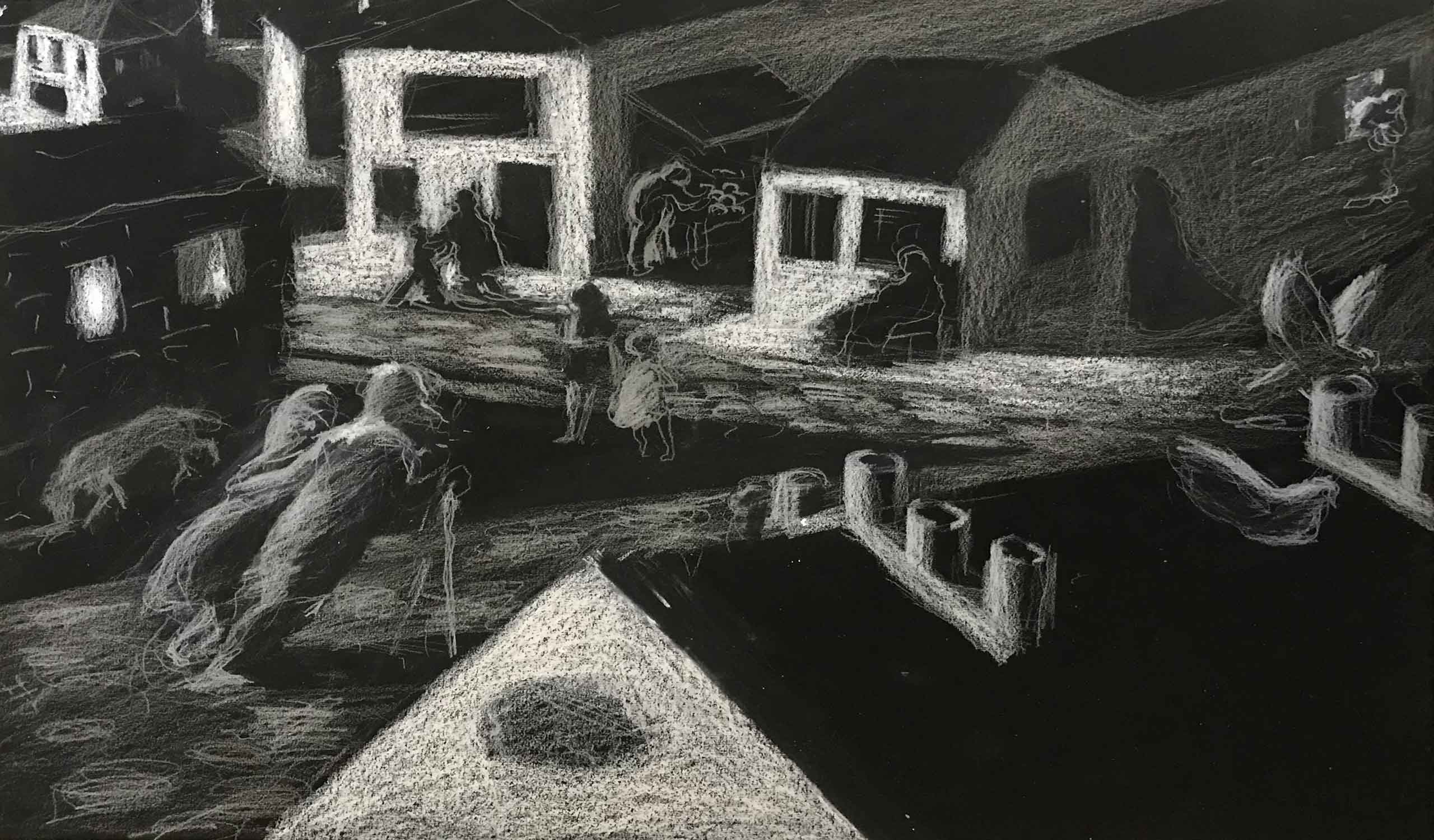Winner & Shortlist | 2020 Tarpaulin Sky Book Award
At a time when happiness feels difficult to come by, we are happy to announce our short-listed manuscripts and the winner of the 2020 Tarpaulin Sky Book Award.
For anyone who missed it, we published our Longlist in May. Every one of those manuscripts is worthy of publication, and we hope that other presses will use our lists as recommendations. (Indeed, numerous manuscripts have already been acquired.) We thank every author who sent us their work.
We hope to open our reading period again, before too terribly long. Maybe in the autumn. Maybe in the spring. You can join the TS Family Newsletter to stay in the loop.
At a time when happiness feels difficult to come by, we are happy to announce our short-listed manuscripts and the winner of the 2020 Tarpaulin Sky Book Award.
For anyone who missed it, we published our Longlist in May. Every one of those manuscripts is worthy of publication, and we hope that other presses will use our lists as recommendations. (Indeed, numerous manuscripts have already been acquired.) We thank every author who sent us their work.
We hope to open our reading period again, before too terribly long. Maybe in the autumn. Maybe in the spring. You can join the TS Family Newsletter to stay in the loop.
WINNER
WINNER
Suspect
Gina Tron
Braiding essays on school shootings with a memoir of the author’s own teen infamy, Suspect documents the hurtling metamorphosis of a bullied girl into a perceived budding mass murderer. In the days after Columbine, Gina and a fellow outcast write a threatening note to a bully, drawing the attention of police. The school’s vice-principal scrutinizes Gina’s earlier work: a rhyming short story about a massacre at a teen dance. News vans descend, and rumors ricochet through a small Vermont community: Gina and her friend plan to shoot up their junior prom. Suspect recounts those fraught days as well as the author’s transformation in years since — from a supposed teen criminal to a respected reporter on crime and social issues; from authoring the viral article “I Was A Suspected School Shooter” at VICE, to a dream job covering true-crime stories for Oxygen. Suspect delivers the honest and nuanced discussion of school shootings that the U.S. desperately requires.
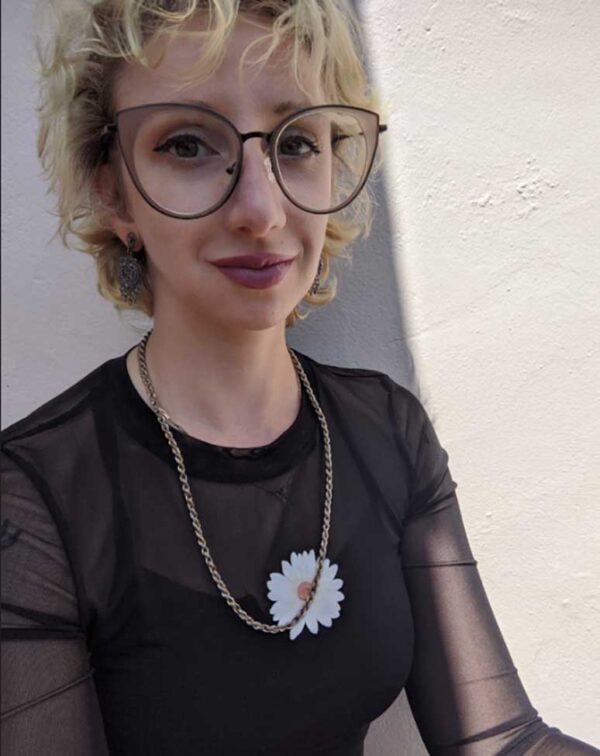
Gina Tron
That night, I was barraged with messages on AOL the second I signed on. Every time I Xed out of a box, a new one immediately popped up. Messages from different classmates I never talked to in person began bombarding my screen.
Ding
“Do you really wanna kill everybody?”
Ding
“Fuck you, psycho.”
Ding
“Why do you want to murder my friend?”
Ding
“I heard you want to kill my sister.”
I wrote back to the last one, because I was growing increasingly interested in who was on my supposed hit list. I said, “I don’t want to kill anyone. Who’s your sister?”
Gina Tron is the author of the books You’re Fine (2014), We Met on the Internet (2015) and Eggolio and Other Fables (2016). Her first poetry collection, Star 67, will be released in November with Vegetarian Alcoholic Press. Gina has worked as a journalist in Vermont and Colorado, has reported for publications including the Washington Post, VICE, Daily Beast, Salon, and Politico, and is currently a true-crime reporter for Oxygen. She has an MFA in Writing and Publishing at the Vermont College of Fine Arts. Her poetry has been published in journals including Green Mountains Review, Entropy, Junto Magazine, and Tupelo Quarterly.
SHORTLIST
SHORTLIST
Discipline Park
Toby Altman
Toby Altman was was born in Prentice Women’s hospital in Chicago. The building was a landmark of architectural brutalism, designed by Bertrand Goldberg in 1975. In 2014, Northwestern, the university where Altman worked at the time, tore it down. Discipline Park obsessively documents the demolition of the building. Altman takes the demolition as a cruel allegory of neoliberalism: the way it makes us draw sustenance from institutions that poison and erase our bodies, habitats, and histories.
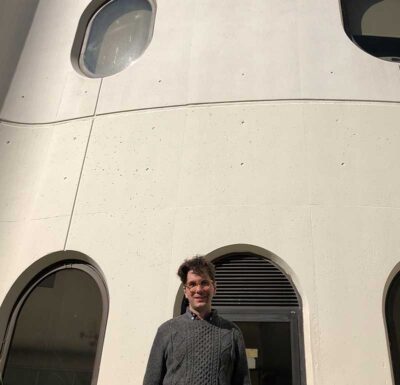
Toby Altman
Upon closer inspection, with instruments more powerful than the genital eye, it disaggregates into a fulsome, fresh-smelling garden. Fields of thistle and wet asparagus. Bonsey bitter and cordial lavender. Meanwhile, the plastic is burned into its flesh—forming, as it were, a suture. It signifies a tongue. An exposition of dark speech. All its receipts were found, under trial, to be falsified.
Toby Altman is the author of Arcadia, Indiana (Plays Inverse, 2017) and several chapbooks, including Every Hospital by Bertrand Goldberg (Except One), winner of the 2018 Ghost Proposal Chapbook Contest. His poems can be found in Gulf Coast, jubilat, Lana Turner, and other journals and anthologies. He holds a PhD in English from Northwestern University and an MFA in Poetry from the Iowa Writers’ Workshop.
One or Several Deserts
Bridget Brewer
Queer, blistering, defiant, seven intimate fictions — in the anus of a bull from Greco-Roman myth, on a pig farm in Oklahoma, in forests and deserts after the end of the world — give voice to bodies at the margins as they yearn and claw at their own flesh. Some of these bodies are lost; some find rebirth in a sentient disease; some eat (out) the bowels of their lovers; some wrestle with sexual awakening and dysphoria at the hands of a giant stone. All desire freedom from the wasteland of language. There will be no gods and no masters at the end of the Anthropocene, and this collection crows for that future.
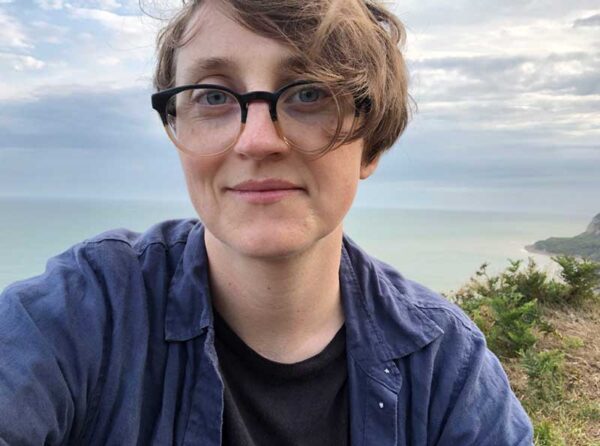
Bridget Brewer
How I ached. I can’t begin to describe it. Repetition gives way to weight. I trembled. I moaned. I mean to tell you I stretched all my holes for you. Don’t you wonder how you fit inside me? Hours. Widening myself with candles, root vegetables, handles, trinkets. Sleeping stuffed. The fists of my handmaidens inside me all night, quivering to keep still, fluttering from the effort and disgust they endured. A treasure trove; a cabinet; a preparation; an altar: inside me a carrot, a candle, a rope, a stone, a wild boar’s shank bone: polluted to be pure, thusly, for you, how I yearned, for you, Horned One.
Bridget Brewer is a writer, educator, and performer based in Austin, TX. Their work can be found at bridget-brewer06.com
A Petit Mal
Ana Maria Caballero
Ana Maria Caballero wrote A Petit Mal over eight months, beginning just after her son was diagnosed with epilepsy. Once Caballero started writing, she could not, would not, stop. The end result is a hybrid book that takes multi-faceted stabs at the nature of emotions, of illness, of healing, of faith, of loss. Stabs that elicit fresh meaning by mixing the muscle, the marrow, of words.

Ana Maria Caballero
The medical clinical procedure by which an illness is diagnosed will not be presented here. Only the disruptive experience of it. Not personal illness but illness of other, illness of child. Do not stop reading for fear this will be sad. It will not. Not the entire way through. Only a little, no longer than the duration of time of moment, of event. Sad because of child, and even not being parent, sadness of ill child is experienced vividly, is readily accessible, in adult form. Even when not experienced, disruptively, as specific sequence that happens in a singular story of life. Even when read.
Ana Maria Caballero was born in Miami in 1981 but spent most of her childhood in Bogotá, Colombia. She is currently seeking an MFA in Poetry at Florida International University, where she was runner-up for the Academy of American Poets Prize. In 2003, she graduated with a magna cum laude B.A. in Romance Studies from Harvard University. Her collection Entre domingo y domingo (From Sunday to Sunday) won Colombia’s 2014 José Manuel Arango National Poetry Prize. Finishing Line Press published Mid-life, her first chapbook, in 2016. Her work reached the final round of consideration in Ploughshares’ 2019 Emerging Writer’s Contest, judged by Leslie Jamison. Her prose was shortlisted for Redivider’s 2019 Blurred Genre Contest. A complete list of her published work can be found at anamariacaballero.com.
The 8th House
J K Chukwu
Moving between various genres and media, The 8th House is impossible to pin down or to put down. It’s a novel, certainly. With illustrations — and footnotes. It’s an honors thesis. It’s concrete poetry. It’s a script. Alternately searing and hilarious, wrenching and beautiful, at all times The 8th House is a compelling manuscript from an important emerging writer.
Dear Committee,
It has come to my attention, that smoking kills, along with police, loner white boys, and looks. While embroiled in the process of trying to live, I have written this honors thesis. It is dedicated to the First Years who haven’t yet died from alcohol poisoning, exhaustion, or overdosing.
This work has been a labor of love and of hate. In it, you will find juxtaposition, verisimilitude, French, Freud, and anything else I’ve wasted 60K a year to learn.
I would like to thank my Advisors: Mr. White Supremacy, Mr. Capitalism, Ms. Racism, and of course my Life Partner for all the guidance they have provided during this process.
Yours Truly,
Sahara
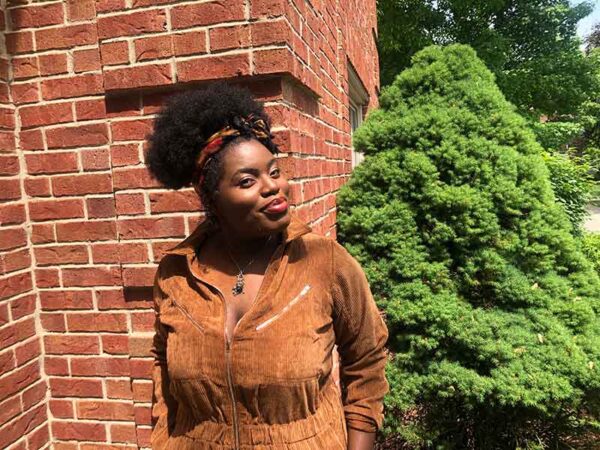
J K Chukwu
J K Chukwu is a half Nigerian, half Detroitian writer from the Midwest. She received her MFA from Brown University. During her time at Brown, she was awarded the Mark Baumer Prize for Language Art, and was the two time winner of the Frances Mason Harris ’26 manuscript prize. Her writing is rooted in examining the strangeness, depravity, and trauma that is contained in everyday life. She was a 2019 Lambda Fellow and her work has appeared in Black Warrior Review, DIAGRAM, TAYO, and elsewhere. Her audio essay, “Love Sounds,” published by A Velvet Giant was nominated for a Pushcart Prize.
Fall Garment
Paul Cunningham
Inspired by the author’s personal trek to Apollo’s heights; Blake’s “Book of Thel”; the Reagan administration’s response to America’s AIDS crisis; Sir Thomas Browne’s Christian burial methods; fashion designer Thom Browne’s contemporary menswear; Richard Strauss’s “Death and Transfiguration” tone poem; and Luchino Visconti’s 1971 film Death in Venice, Paul Cunningham’s Fall Garment is a poetry manuscript quite unlike any other.
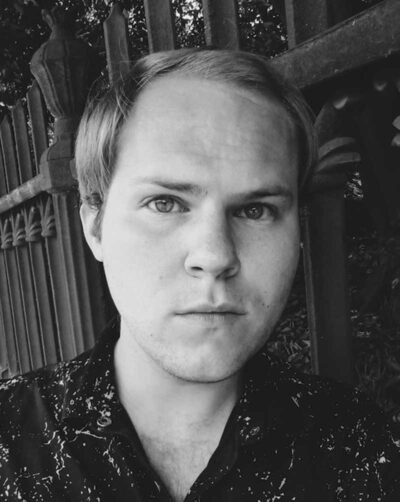
Paul Cunningham
A boy finds human brains all rolled up in sand. Mistakes the brains for funnel cake. He eats the brains. He was hungry after all. He was abandoned by his family. All-American family, always hungry for another crime scene. He escaped a conversion therapy camp. He knows all the words to “High by the Beach.” He is thirteen years old and super hungry.
Paul Cunningham is the author of the forthcoming bilingual poetry collection The House of the Tree of Sores (Schism, 2020). From the Swedish, he is the translator of Helena Österlund’s Words (OOMPH! Press, 2019). He has also translated two chapbooks by Sara Tuss Efrik: Automanias (Goodmorning Menagerie, 2016) and The Night’s Belly (Toad Press, 2016). His writing and reviews have recently appeared in Snail Trail, Harvard Review, Poem-a-Day, bæst, Kenyon Review, Quarterly West, and others. He is the managing editor of Action Books, founding editor of Deluge, co-editor of Radioactive Cloud, and co-founder of the Yumfactory Reading Series. He is a PhD candidate at the University of Georgia. @p_cunning
Maximum Compound
Stephanie Dickinson
A nonfiction manuscript born of the author’s longtime correspondence and friendship with Krystal Riordan and other inmates at the Edna Mahan Correctional Facility for Women, Stephanie Dickinson’s Maximum Compound is the best sort of true crime: deeply empathetic to the “characters” at the heart of the story.
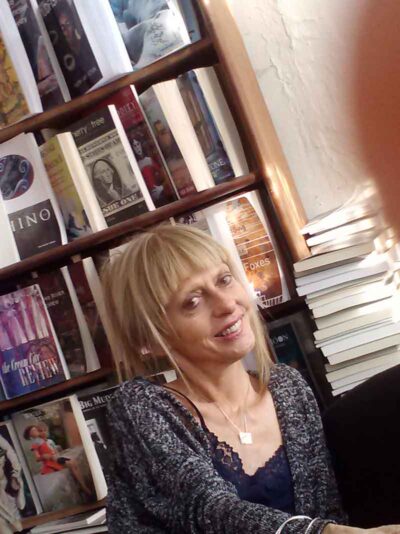
Stephanie Dickinson
Breakfast is served at 6:30 a.m. in Mess Hall, and since Krystal Riordan, Inmate #661387, must be at work by 6:45 a.m., she rises before the lights turn on and gets herself to the sink. Running the hot water until it’s scalding, she fills her mug, then adds a heaping tablespoon of Maxwell House instant coffee with caffeine and 13 sugars: Maximum Compound’s speedball. She likes holding the hot mug between her palms and cooling the coffee with her breath, then slurping. One day she’ll ride a horse into the foothills she’s seen on TV, and there will be no one within miles to order her around. No more officers barking. Get up, Riordan. Line up for Count. She’s already served a decade of her 30-year sentence and will serve, at the least, another decade. Coffee burns her tongue the way she likes it. She hears the horse’s tail swishing in the dry grasses. Her long legs wrap around the mare’s flanks (snuggly, perfectly). They stop in a grove of fruit trees, and she reaches up for a ripe peach.
Stephanie Dickinson lives in New York City with the poet Rob Cook and their senior feline, Vallejo. Her novels Half Girl and Lust Series are published by Spuyten Duyvil, as is her feminist noir Love Highway. Other books include Heat: An Interview with Jean Seberg (New Michigan Press), Flashlight Girls Run (New Meridian Arts Press), The Emily Fables (ELJ), Girl Behind the Door (Rain Mountain Press), and her just-released Big-Headed Anna Imagines Herself (Alien Buddha). Her stories have been reprinted in New Stories from the South, New Stories from the Midwest, and Best American Nonrequired Reading.
The Intimacy Trials
Aja Couchois Duncan
Aja Couchois Duncan is interested in the relationships between all sentience — rock, river, scree — and the two-legged ones who often inhabit place without any understanding of their inherent interdependence. Her work is an exploration of this separation and its legacy of violence and trauma: “American” history: slavery, genocide. “But always there are other forms of sentience to call us home,” Duncan wrote in her cover letter, “The mountains speak. The ravens cry. Water rises, floods the banks, washes valleys clean.”
In light we are. In darkness.
The distribution of weight on the earth has been altered, affecting polar motion, changing the planet’s direction.
We are tipping back towards Europe, towards the progenitors of slavery, genocide, another continent of.
That angry mother. The one who flushed them from her vaginal folds. Made scrapings of our skin and teeth. Plucked at our excessively dark hair. Come here, she said, carrying a teaspoon, I need to measure the purity of your blood.
We are a precarious diaspora. There is nowhere left to go.

Aja Couchois Duncan
Aja Couchois Duncan is a social justice coach and capacity builder of Ojibwe, French and Scottish descent who lives on the ancestral and stolen land of the Coastal Miwok people. Her debut collection, Restless Continent (Litmus Press, 2016) was selected by Entropy Magazine as one of the best poetry collections of 2016 and was awarded the California Book Award for Poetry in 2017. Her newest book, Vestigial, is forthcoming from Litmus Press in the spring of 2021. She holds an MFA in Creative Writing from San Francisco State University and a variety of other degrees and credentials to certify her as human. Great Spirit knew it all along.
Air Hunger
Lindsay Herko
Described by the author as “a clot and some ‘Caspers’ of hybrid works,” Air Hunger explores “the yearning space between wanting to be embodied or released to being an essence.” We can’t describe it any better, and we enjoy dwelling in the phantasmagoria of its unknowns and knowns: the witches, the blood, the ghostly mothers …

Lindsay Herko
Our mothers left Earth to be reduced to what causes swear words in the dark. The trip over a rock when you are trying to commit a crime at the beach after hours, the thing that attracts a horse fly to the zone of your zipper when you are trying to shove a jelly donut down your pants to treat your girlfriend so she believes camping can be fun, the black lactating dark that robs you of your figure, lessening the odds you’ll be loved by an anonymous peeper in the parade of people on the night pier. Our mothers left the earth to become an essence that brings scenes together, but an essence who would snub you at a séance. For disembodied, there is no proof you ever cracked the dry wall of their uterus. There is no proof your name rode the love boat through their heart. They like this for they cannot be tracked down.
Lindsay Herko writes fictions about mothers who somersault like ghosts through juice and memoirs of digesting McDonalds while someone is dying. MFA’d at the University of Notre Dame; her prose has appeared in journals with pretty names like Caketrain 11, Sundog Lit, Salt Hill 34, Luna Luna, and The Rain, Party, and Disaster Society. Visual art — amalgamations of waterslides, planets and pop stars — have come and gone from BOAAT 2 and Pop Soppins. Last: she identifies as being “of Lake Ontario” and several pools and water features in Walt Disney World.
To love an artist, or, the body of an adult chinese american woman
Valerie Hsiung
Describing her work, Valerie Hsiung writes: “More than anything, the poetry I am interested in is not Poetry with a capital P. I am interested, rather, in a poetry that seeks to bring It down (—> it). Or, I am interested in listening continuously to the language, in listening to the language beneath the language and in locating the areas where the language itself traps the element of poetry. I did used to believe, perhaps even fervently, in the Poet, capital P. How did I not realize that I was passively saying ‘yes’ to an inherited poetry, when poetry can never be inherited. No, there is no room for the porcelain, for the archetype, for the idea of what a ‘powerful poem’ should be, in poetry. It seems ‘I’ may not succeed in bringing this language down at all. i must lie down in the page itself.” (We also recommend a recent TS Mag interview with Hsiung.)

Valerie Hsiung
In ghoulishness Anglo-Saxons brought Hans Christian Andersen’s Danish to English, both being Western Germanic in origin.
When English arrived to the British isles by way of the Anglo-Saxon settlers, the language they spoke was what we might think of today as Old English. Chaucer wrote his best-known work during a time,
when Old English was turning
into Middle English, when the endemic of the plague became epidemic. Boats and trade passaged this way. Though there is no known evidence that oregano, which is found in natural abundance in the once Roman-occupied region of the Mediterranean, came to be of any real use for those afflicted with the plague, I have packed the essential oil in abundance for our forthcoming itinerary which will search for the Tatar route commonly used to abduct Chinese women and through which the plague was undoubtedly spread. To spread is vaster than even to proliferate. Once a living body is infected with the plague, it becomes known to us as airborne.
Valerie Hsiung is a poet, writer, performer, and the author of four full-length poetry and hybrid writing collections — You & Me Forever (Action Books, 2020), outside voices, please (CSU, 2021), hummingbird et partygirl (Essay Press, 2021), and e f g (Action, 2016). Her work can be found in or is forthcoming from places such as The Nation, The Believer, Chicago Review, PEN America, jubilat, Denver Quarterly, Black Sun Lit, New Delta Review, and beyond. She has performed her little poetry theater at Treefort Music Festival, The Poetry Project, Poetic Research Bureau, Shapeshifter Lab, and The Silent Barn. Born in the Year of the Earth Snake and the Tiananmen Square Protests and raised by Chinese-Taiwanese immigrants in Cincinnati, Ohio, she now lives in Brooklyn, New York. valeriehsiung.com
Collection / Agency
Carrie Lorig
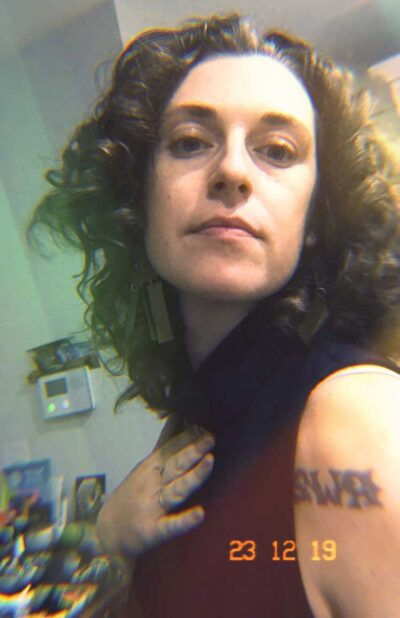
Carrie Lorig
Carrie Lorig’s manuscript, Collection / Agency, compromises three distinct but inseparable sections: “The Book of Repulsive Women,” exploring the flowering wound of Djuna Barnes’s 1915 chapbook of the same title; “The Blood Barn,” a correspondence with the body and with other bodies, speaking to the trauma of eating disorders and trauma in general; and “Collection / Agency,” a visceral examination of reading, of length, of the intimate or bold act of quoting / repeating, of the act of disappearing / reappearing, and of how we expand notions of reading / writing / narrative through a textured, dynamic chronicle of time.
N and I are driving past the elaborate restaurant, the one that had been blue and still has flared edges and is falling apart there. I can’t believe it hasn’t been torn down yet, says N with a voice or a tone I will describe here as broken away from the flock to think. N answers his own fragment / his own question. American space, I don’t know where I am today. Because it’s still burning, N says. It’s still burning there.
Carrie Lorig is the author of The Pulp vs. The Throne (Artifice Books) and several chapbooks, including The Blood Barn (Inside the Castle), The Book of Repulsive Women (Essay Press), and nods (Magic Helicopter Press). Her work can be found in The Brooklyn Rail, The Journal Petra, Dreginald, Black Warrior Review, and elsewhere. She is a doctoral student in School Psychology at Georgia State University.
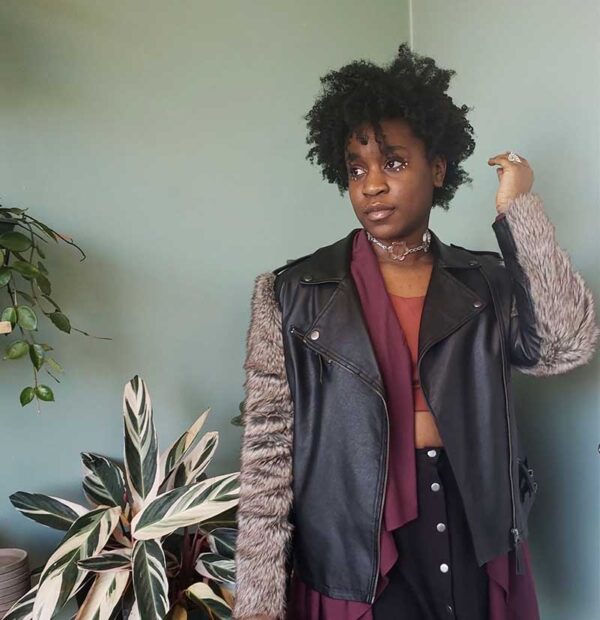
Alyssa Moore
Current Affairs and Others
Alyssa Moore
Visual poems that explore the intimate digital space of the desktop, Current Affairs explores the self that is made through digital acts; how daily interfacing with technology causes mundane activity to become daily ritual. Describing the genesis of the manuscript, Moore writes, “Saving documents, keeping notes, writing emails, using social media all occur in digitally curated rooms. I wanted to try and capture snapshots of my digital living rooms to see how my own self was affected by these spaces. These poems were created in a period of time where I was one of a handful of black writer in an overwhelmingly white institutional space. I had been invited to be there with excitement, but when I arrived, my voice and its concerns were frequently shunned. I wondered if it was possible to create a space where a black, queer voice could exist on the page sans tone-deaf critique. Thus, the screenshot form was born …. a way to think about ideas of class, race, respectability, and sexuality in semi-private space.”
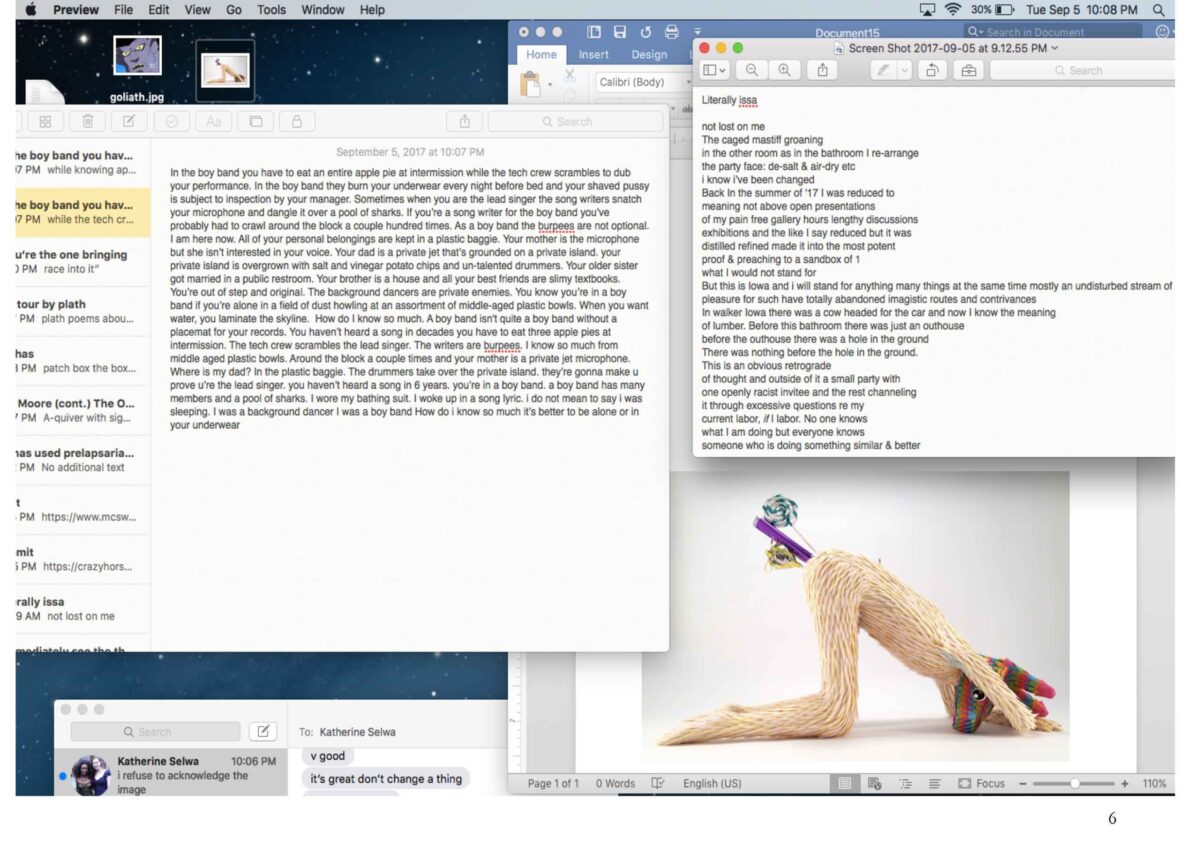
Alyssa Moore is a black, queer multi-disciplinary artist based in Chicago, who holds degrees from the Iowa Writers’ Workshop and Harvard. Her work has appeared in Pulpmouth, Tagvverk, Hyperallergic, Bennington Review, POETRY, and elsewhere.
The Confession of Copeland Cane V
Keenan Norris
After his childhood friend Miguel is killed in an altercation with a police officer, Copeland and a number of Miguel’s other friends organize a protest rally in the streets of Oakland. When a policeman is shot and killed at the rally, the other organizers are quickly rounded up, leaving Cope the lone fugitive in the case. Given a 48 hour ultimatum by law enforcement to turn himself in before they begin charging suspects, his juvenile criminal record leaked to the public, Cope contacts his estranged girlfriend via an obscure app to tell not merely the story of who shot the sheriff but the story of his life. He asks only that she hear him “all the way out” and then publish it to the world so that the public may come to their own conclusions.

Keenan Norris
This won’t jeopardize you no kinda way; it leaves no trace and costs you nothin, except maybe in your feelings. I cain’t tell you about your heart. But I need to tell you what’s in mines. Nobody wants to know why shit hit that swerve and went left, but the fact is it was all kinda facts done built up to the one big fact, excuse me, bump that, the one pivotal incident that everybody and they momma (except for you, apparently) cares most about: The crime in question, the weed that worked its way up from spoiled soil to choke the chief gardener.
Keenan Norris’s novel Brother and the Dancer won the 2012 James D. Houston Award. He served as editor for the anthology Street Lit: Representing the Urban Landscape. His chapbook by the lemon tree was published in 2018. His short fiction in the anthologies Oakland Noir, Inlandia and San Bernardino, Singing. His commentaries on the 2016 presidential election “Post-Mortem Morning: Oakland and the Remains of the Left” and “Ben Carson, Thug Life and Malcolm X” were published in the Los Angeles Review of Books. Norris serves as guest editor for the Oxford African-American Studies Center with a focus on California scholarship. He teaches American literature and creative writing at San Jose State University.
The Confession of Copeland Cane V
Keenan Norris
After his childhood friend Miguel is killed in an altercation with a police officer, Copeland and a number of Miguel’s other friends organize a protest rally in the streets of Oakland. When a policeman is shot and killed at the rally, the other organizers are quickly rounded up, leaving Cope the lone fugitive in the case. Given a 48 hour ultimatum by law enforcement to turn himself in before they begin charging suspects, his juvenile criminal record leaked to the public, Cope contacts his estranged girlfriend via an obscure app to tell not merely the story of who shot the sheriff but the story of his life. He asks only that she hear him “all the way out” and then publish it to the world so that the public may come to their own conclusions.
This won’t jeopardize you no kinda way; it leaves no trace and costs you nothin, except maybe in your feelings. I cain’t tell you about your heart. But I need to tell you what’s in mines. Nobody wants to know why shit hit that swerve and went left, but the fact is it was all kinda facts done built up to the one big fact, excuse me, bump that, the one pivotal incident that everybody and they momma (except for you, apparently) cares most about: The crime in question, the weed that worked its way up from spoiled soil to choke the chief gardener.

Keenan Norris
Keenan Norris’s novel Brother and the Dancer won the 2012 James D. Houston Award. He served as editor for the anthology Street Lit: Representing the Urban Landscape. His chapbook by the lemon tree was published in 2018. His short fiction in the anthologies Oakland Noir, Inlandia and San Bernardino, Singing. His commentaries on the 2016 presidential election “Post-Mortem Morning: Oakland and the Remains of the Left” and “Ben Carson, Thug Life and Malcolm X” were published in the Los Angeles Review of Books. Norris serves as guest editor for the Oxford African-American Studies Center with a focus on California scholarship. He teaches American literature and creative writing at San Jose State University.
Cautionary
Colleen O’Connor
Cautionary is a fragmented book-length essay that explores why women’s narratives tend to fall into one of two camps: the redemption narrative or the cautionary tale. By weaving together three narratives — the author’s own, her dead best friend’s, and that of Joan Vollmer Burroughs, the common-law wife William Burroughs murdered — Cautionary resists the redemptive/cautionary dichotomy while exploring its influence and weight.
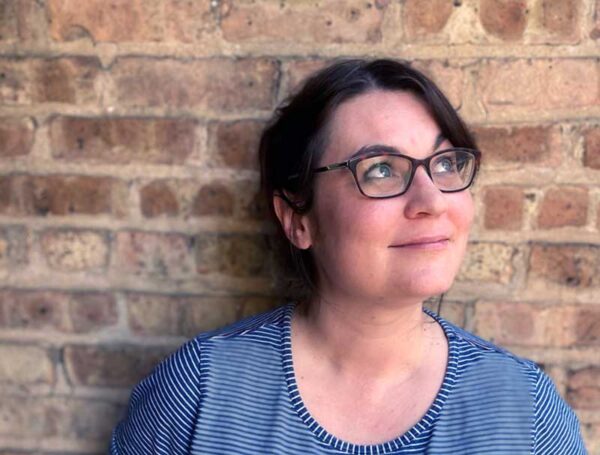
Colleen O’Connor
The first time I was in fourth grade and it was an accident. I decided I wanted to die and figured to do so I should stab myself in the chest. This proved to be more difficult than I had expected, what with the breastbone, the dullness of my faux-silver, serrated steak knife. I took the knife from the kitchen, erroneously thinking that its choppy edge would do more damage than a sharper, smoother blade, went to my bedroom and locked the door, stood in front of my mirror, and thrust the knife into myself. Instead of a plunge, I ended up with more of a scrape and dent—bloody, but shallow. I looked at myself in the mirror—shirtless, my tiny chest smudged with red. I decided that would be enough.
Experts say that self injury releases endorphins, and those endorphins soothe. It seems counterproductive, but the flashes of self-induced pain do, somehow, calm. And there’s the rub.
Colleen O’Connor received her MFA in Nonfiction from Columbia College Chicago. She is the author of the chapbooks The Pretty Thing To Do (Dancing Girl Press) and Conversations with Orson (Essay Press). Recent work has appeared in the Atticus Review, Barrelhouse, and is forthcoming in the Mad Creek Books essay anthology Don’t Look Now: Things We Wish We Hadn’t Seen. She lives in Chicago, where she serves as co-editor of The Lettered Streets Press.
FuturePanic
Amish Trivedi
“The manuscript is about some classic themes,” Trivedi writes in his cover letter, “time and space and dying and spree killings and, I think most of all, falling in love.” What he didn’t write, but might have, is I tore my own fucking heart out in writing this book. It shows, and we appreciate it all the more when too many poets are still content to pretend the world is not screaming and on fire. “We are the left behind,” reads FuturePanic, “who did all the leaving behind and have grown accustomed to our power and our errant authority and our capital in a society that we cannot imagine without us.” What we cannot imagine is a poetry press that wouldn’t like to acquire Trivedi’s manuscript sooner rather later.
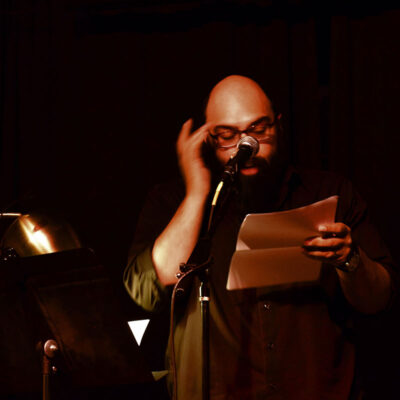
Amish Trivedi
My panic is not a nanomachine that can’t stop itself— it’s a human with a gun that won’t. My panic is not a bug or bot that replicates— it’s a human with nothing to replicate for. And my panic is not the sun expanding and boiling away our seas— it’s that we’re doing it to ourselves and to every other living creature and we can’t help ourselves.
That much I remember. And memory is a fetish relived until it cannot be, until it fades or gets blown out the back of the head.
Amish Trivedi is the author of Sound/Chest and Your Relationship to Motion Has Changed. He has an MFA from Brown and a PhD from Illinois State. He lives in Maryland.
Myth of the Garbage Patch
Maya Weeks
Maya Weeks grew up surfing and became committed to the ocean from a young age; as a poet, she became concerned with the ways the ocean is and is not represented in contemporary poetry. In 2013, she began Myth of the Garbage Patch, which interrogates origins and cultural understandings of marine pollution in order to understand marine pollution as a colonial project of capital accumulation and gendered violence.
i didn’t mean to turn garbage into my life’s work
but my life was meaningless
as were all of ours under capitalism
i was sick of throwing things away, like shoes, and my friendsi wanted to be my own person / but i wasn’t anyone
peeing beside the water tank
chopping wood in the living room
spitting in the dark, peeing in the dirt, peeing behind the water tank
boiling water on wood-burning stove
sitting next to it, basically like being in a saunafor pleasure i move fire around. sit in the dark and watch it burn

Maya Weeks
Maya Weeks is an artist, writer, and geographer from California working on oceans, waste, climate, and gender. She holds her BA in Language Studies (Spanish) from the University of California in Santa Cruz and her MFA in Poetry from Mills College. She is currently a PhD candidate in Geography at the University of California in Davis. Her dissertation uses artistic research to investigate marine debris as a form of capital accumulation that disproportionately affects people sexed female at birth.
These Dark Skies
Arianne Zwartjes

Arianne Zwartjes
From the author of Detailing Trauma: A Poetic Anatomy, this collection of new essays explores the human propensity toward violence, and the complexity and contradictions of grappling with the darker sides of human nature. These Dark Skies follows the trajectory of the author’s year of living in the southern Netherlands, mixed with the narrative of her relationship with her wife, who is Russian, and the unfolding of both the refugee crisis and the uptick in terrorist acts in France, Greece, Austria, Germany, the Balkans. “On it’s way,” Zwartjes writes in her cover letter, “the writing traipses off to investigate a broad array of other topics, including EMS active-shooter principles, violent incidents in Europe, and mass-casualty shooter incidents in the US; drone strikes, tear gas, and military intervention; the writings of James Baldwin, the Dutch blackface celebration of Zwarte Piet, and constructions of whiteness in Europe and the US; and visual arts including Russian avant-garde painters, an Iraqi choreographer living in Belgium, and German choreographer Pina Bausch.”
I am on my way to the Philippines to teach a medical course, and one of the entertainment options on this flight is a Berlitz language-learning program; it teaches basic vocabulary using rudimentary video games. Seeking distraction, I turn it on. As I click over and over on the words l’hôpital and un médecin, with little cartoon illustrations of a white male doctor and an ER cubicle — accompanied by absurd boinging noises for each correct choice—all I can think of is Kunduz. The evening before I’d heard several radio interviews with spokespersons from Médecins Sans Frontières, whose hospital in Kunduz was recently bombed to ruins by U.S. and Afghan forces. They detailed the destruction found by a preliminary MSF investigation: patients literally burning in their beds, medical personnel gunned down as they fled across the courtyard.
The strike followed a devastating week for the hospital, in which fighting drew nearer and the ER and ICU were overflowing with patients: doctors, unable to leave, set up makeshift rotations and watched with panic as more and more patients were brought in, watched with exhaustion and despair each time a patient was lost. “The people are being reduced to blood and dust. They are in pieces,” said Dr. Osmani, an Afghan doctor who traveled from his own hospital in Kabul to volunteer in Kunduz on weekends, and who was killed a few days later in the U.S. bombing of the hospital.
Arianne Zwartjes teaches for Sierra Nevada University’s low-residency MFA program. She has spent time as a wilderness-medicine instructor, an EMT, a motorcyclist, and a carpenter, and has lived in China, India, Mexico, Israel, and the Netherlands. She is the author of the lyric nonfiction, medical-humanities book Detailing Trauma: A Poetic Anatomy. Her writing won the 2011 Gulf Coast Nonfiction Prize, was a Best American Essays Notable Essay, and has appeared in Entropy, Kenyon Review, Fourth Genre, Assay, and elsewhere. She splits her time between Colorado and Washington state. Find her at ariannezwartjes.com.
